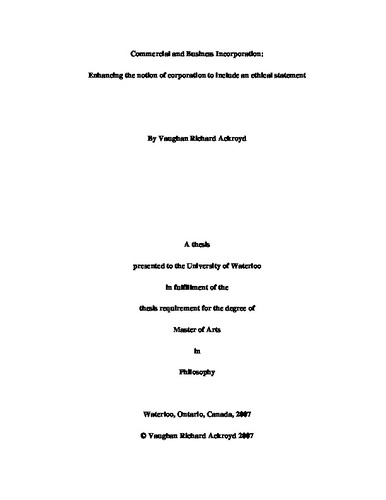| dc.description.abstract | Today’s modern, Canadian, business corporations are hugely influential in determining public policy and many aspects of people’s lives. Because this influence permeates so much of our social construct, we expect corporations to act in an ethical manner. Yet, at the very baseline of legal incorporation, there is not a requirement for corporations, per se, to be ethical or to act in an ethical manner. This situation has set up a form of ethical dualism, with individual citizens being required to act in certain prescribed manners, while corporations, which in most cases comprise individual citizens, are allowed to ignore or even to flaunt similar ethical rules and standards. In this investigative paper on corporate applied ethics, I will examine arguments for and against the notion of including ethical responsibility statements within the concept of incorporation. This paper will provide a historical framework in which to view some of the complexities involved, and examine certain influential assertions made by Milton Friedman.
The paper will begin with a look at what is meant by corporation in this context. This will be followed by an analysis of the arguments put forward by Milton Friedman in his famous essay “The Social Responsibility of Business is to Increase Its Profits” and other related arguments. These other arguments, as objections to the inclusion of ethics within the notion of corporation, fall into three main types: objections to concept; to ability; and to process. I will review each in turn, with the hope that, by dispelling the Friedmanian arguments against corporate ethical inclusion, a new baseline for incorporation might be established.
The second part of the paper will examine what kind of ethics might best suit the corporation. It will also consider ethical growth with respect to business. The paper will conclude with a suggestion as to how the inclusion of ethics within the notion of incorporation might be accomplished. | en |

